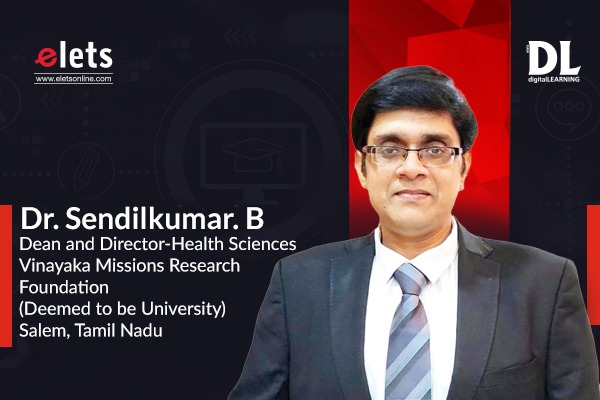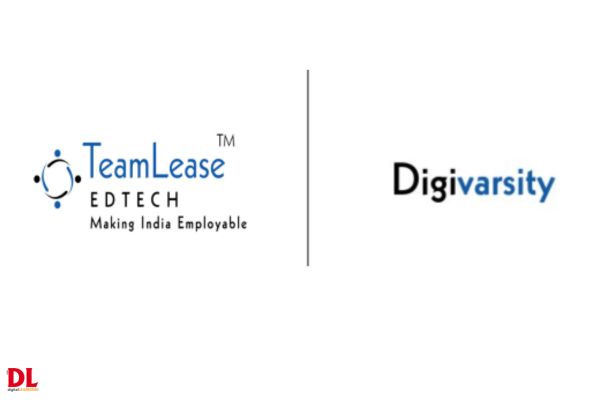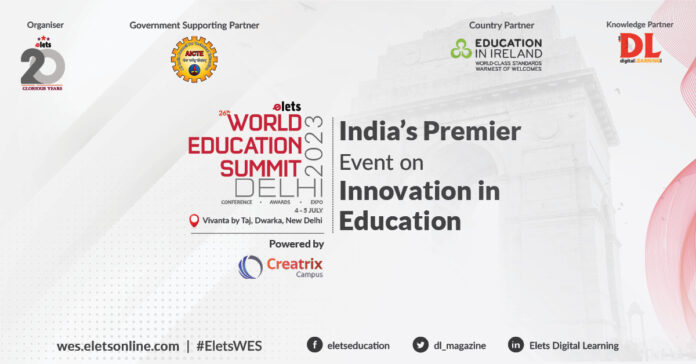The 26th Elets World Education Summit, a global platform for decision-makers, thought leaders, and experts in the field of education, is set to take place on 4-5 July at Vivanta by Taj, Dwarka, New Delhi.
The exclusive closed-door summit will feature two parallel tracks focusing on school education and higher education, bringing together eminent educators, policy-makers, and industry experts to discuss and deliberate on the challenges and opportunities in the education sector.
26th Elets World Education summit in its two-days will feature an engaging agenda with keynote speeches, panel discussions, industry presentations, and networking opportunities. With a focus on “Navigating Education in a Globalised World”, the summit aims to facilitate collaboration and knowledge exchange among stakeholders for building a competitive education system in today’s ever-evolving digital age.
The event will begin with a warm welcome address by Dr. Ravi Gupta, Founder, Editor-in-Chief, and CEO of Elets Technomedia.
Higher Education Track
Day 1 of the Higher Education Track will feature a power-packed inaugural session and panel discussion on various topics including scaling future-readiness in higher education, redefining pedagogy through technology and innovative teaching practices, bridging the skills gap between higher education and industry needs, and adapting to a tech-driven world with artificial intelligence, etc. The panels will feature renowned speakers from esteemed institutions and organisations, including Indian Institute of Management Sambalpur, Chitkara University, Jamia Millia Islamia, and many more.
Prof. (Dr.) T G Sitharam, Chairman of the All India Council for Technical Education (AICTE) will be joining the summit as ‘Guest of Honour’. Addirtionally, distinguished speakers including Dr. Shashank Shah, Director (Senior Specialist – Higher Education) at NITI Aayog; Dr. (Mrs.) Pankaj Mittal, Secretary General of the Association of Indian Universities (AIU), Delhi; H.E. Brendan Ward, Ambassador of Ireland to India; and Sivakumar Veerappan, Founder & CEO of Anubavam Technologies Pvt Ltd, will deliver special addresses during the session.
The highlight of the higher education track will be the keynote session on “Empowering Future-Ready Workforce through NEP 2020: Redefining Skill Development to Adapt 21st-Century Skillsets”. Renowned experts in the field, including Dr. Abhay Jere, Vice Chairman of AICTE; Dr. Abhishek Jain, IAS, Secretary of the Department of Education, Government of Himachal Pradesh; and Eng. Mohammed Mahnashi, SEU President Advisor for Digital Transformation & Data Management at Saudi Electronic University (SEU), Saudi Arabia, will share their insights and expertise on the topic.
The second day of the higher education track, 5th July, will explore the vast opportunities and possibilities in the digital age. The opening session, titled “Enlarging the Horizon of Education on a Global Level: Opportunities & Possibilities in the Digital Age”, will feature notable speakers including Shri A Malla Reddy, Additional Secretary, Department of Higher Education, Government of Telangana; Prof. Binod Kumar Kanaujia from Dr B R Ambedkar National Institute of Technology (NIT), Jalandhar; Prof. M.N Doja from Indian Institute of Information Technology Sonepat (IIIT Sonepat), and Arpan Stephen, Head of E-Learning at Arabian Gulf University, Kingdom of Bahrain.
In addition, industry presentations by prominent organisations such as Camu, WisdomCircle, Anthology, and Lex Counsel will showcase cutting-edge solutions and advancements in the field of education. These presentations will provide valuable insights into the latest trends and technologies shaping the future of higher education.
School Education Track
The school education track will also feature a lineup of esteemed speakers and thought leaders in the field. Participants will have the opportunity to gain insights into the latest developments and trends in school education.
Day 1 will commence with the inaugural panel discussion on “Promoting Multilingualism, Multidisciplinary at School Education: NEP 2020 Perspectives”. The panel will include esteemed panelists such as K Bhaskar, IAS, Commissioner of School Education (Infrastructure), Department of School Education, Government of Andhra Pradesh; Dr. Biswajit Saha, Director (Training & Skill Development) at the Central Board of Secondary Education (CBSE), India, and G. P. Upadhyaya, Cabinet Secretary & Principle Chief Investment Advisor Government of Sikkim. They will share their insights and perspectives on the role of multilingualism and multidisciplinary approaches in school education, in alignment with the National Education Policy (NEP) 2020.
The second day of the summit, 5th July, will feature a keynote address by Naveen Jain, IAS, Secretary, School Education Department, Government of Rajasthan.
One of the highlights of the school education track is the “Opening Session: National Curriculum Framework: Promoting Skills & Competency-based Education”. Moderated by Dr. C.S Nair, Director-Strategy & Skills, Silverline Prestige School, the session will feature esteemed panelists such as Prof. Abha Sharma from the State Council of Educational Research & Training (SCERT), Geeta Varshney from Shri Ram Global School, Dr. Deepika Rathi from Gyaananda School, Dr. Bhavna Chibber from Laburnum Public School, and Sunita Swaraj from The Heritage School.
The summit will also feature panel discussions on crucial topics such as national curriculum frameworks, learning spaces, digital tools, technology in early education, and the impact of artificial intelligence on K12 education, etc.
Moreover, the attendees will have the opportunity to attend industry presentations by renowned organisations such as Sri Connect, Zenda, Tag Hive, and eKal Academy.
26th Elets World Education Awards
The power-packed summit will also host the 26th Elets World Education Awards ceremony, recognising and honouring outstanding contributions and achievements in the field of education.
2 Days of Unparalleled Learning & Networking
Bringing together over 300 decision-makers and top edtech players, the 26th Elets World Education Summit is a significant platform for knowledge-sharing, networking, and collaboration among education stakeholders.
Attendees will have the opportunity to engage in meaningful discussions, gain valuable insights, and explore innovative solutions to shape the future of education.
For more details, visit: wes.eletsonline.com


























